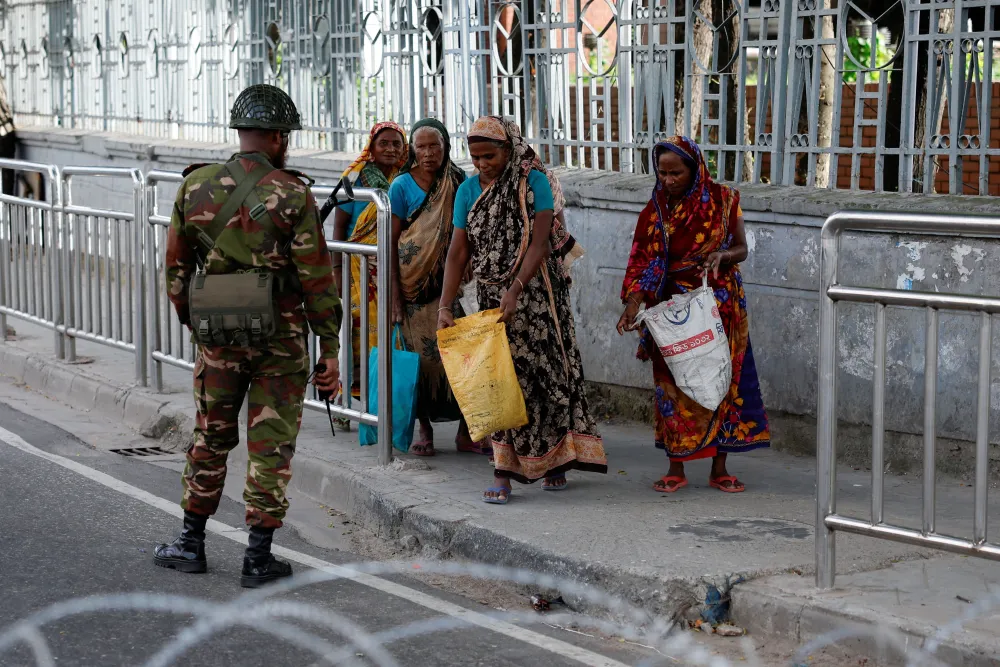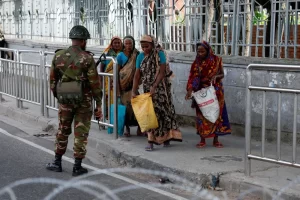
Bangladesh’s internet shutdown cuts off citizens and disrupts businesses

DHAKA
Bangladesh’s internet shutdown cuts off citizens and disrupts businesses. recent week-long internet shutdown in Bangladesh has had far-reaching effects, leaving digital workers unemployed. Disrupting online transactions, and significantly impacting mental well-being.
Md. Rakibul Ahsan, a graphic designer, was on the verge of completing a crucial logo for an international client when the shutdown hit. The sudden blackout stranded him and countless others offline. Halting not just his work but that of many others across the country. The internet shutdown began on July 18, in response to violent student-led protests against government job quotas that resulted in at least 147 deaths.
The protests had escalated into deadly clashes. Prompting the government to impose a nationwide curfew and deploy military forces to patrol deserted streets. The internet blackout, a tactic previously used in refugee camps and around elections. Was part of the government’s effort to manage the unrest.
The Supreme Court’s recent rulg overturnng the lower court’s reinstatement of the contestd quotas ws seen as a partial victory for the protester. The court ruld that most government positions should be filld basd on merit rather than the quotas that had fueled the unrest. While broadband connectivity was partially restored on Wednesday, it came back in phas, with banks and large corporations reconnecting first, while smaller businesses and individual users faced delays.
For freelancers like Ahsan, the shutdown was a severe blow. Independent professionals who rely on freelancing platforms fear losing their rankings and client relationships due to the interruption. Ahsan, who is among Bangladesh’s 650,000 freelancers, felt the impact deeply. “It just does not feel great to fail at the last minute to respond to a client who trusts me,” he said. Many in the IT sector, which contributes $1 billion annually to the economy, experienced similar disruptions.
The government also targeted social media platforms, such as Facebook, accusing them of fueling the unrest. These sites remain offline, adding to the frustration of those affected. Zunaid Ahmed Palak, the technology minister, indicated that repairs were underway to restore telecommunications services after the violence had vandalized critical infrastructure.
Small businesses were hit hard by the curfew and shutdown. Ferdaus Ara Begum, head of the Dhaka-based think tank Business Initiative Leading Development (BUILD), emphasized the enormous stress on small enterprises, which are crucial to Bangladesh’s economy. Faysal Ahmed, who runs a family-owned business in Munshiganj, faced severe setbacks as he couldn’t communicate with customers or operate his business. “For businesses like ours, coping with the losses will take months,” Ahmed said.
Tour operators also suffered. Masuk Rahman had to cancel boat rides to the Tanguar Haor wetland, a popular tourist destination, during a peak season, issuing refunds and facing significant financial strain. “As business owner, we are worrid whether we can recoup our investment, while boat workers who get paid per trip are left without work,” Rahman notd.
Garment workers, who are pad monthly via automatd teller machin (ATMs). Were particularly affectd by the week-long closure of banks and ATMs. Ripon Hossain, a worker from Narayanganj, mentioned that while factories resumed operations And Wednesday. Ongoing restrictions continued to pose challenges. Families relying on online apps for cooking gas or subsidized government food supplies struggled to make ends meet. With some resorting to borrowing cash for groceries.
The internet shutdown also took a toll on mental health. Syed Tanveer Rahman, a psychology professor at Dhaka University. Observed heightened anxiety and stress among the youth, who depend heavily on digital platforms for information. The absence of these platforms increased the risk of spreading misinformation and deepened feelings of isolation. Shaikh Md. Mominul Islam, a gender activist. Described how the lack of internet connectivity exacerbated his sense of isolation and made it difficult to access necessary resources.
International activists have condemned the shutdown, calling for the restoration of internet access. The digital rights non-profit Access Now criticized the measure as ineffective and counterproductive. Arguing that it reduces people’s ability to combat misinformation. Over 300 civil society organizations from 105 countries have signed an appeal urging the government And ensure open, secure, and unrestricted internet access.
The Bangladeshi government has a history of blocking internet access to control dissent . Ancluding during the contentious 2018 election, which saw accusations of vote-rigging by the ruling Awami League party. Bangladesh’s internet shutdown cuts off citizens And disrupts businesses. The following year, the government throttled mobile services at Rohingya refugee camps, affecting aid efforts.
The partial restoration of broadband internet on Wednesday provided some relief. But observers stress that full access, including to social media, is crucial for restoring normalcy. Ferdaus Ara Begum from. BUILD emphasized the integral role And the internet in the economy and daily life. Calling on the government to prioritize complete internet restoration to enable life to return to normal.
The situation highlights the profound impact of digital connectivity on both economic activities. Apersonal well-being, underscoring the need for reliable internet access in today’s interconnected world.